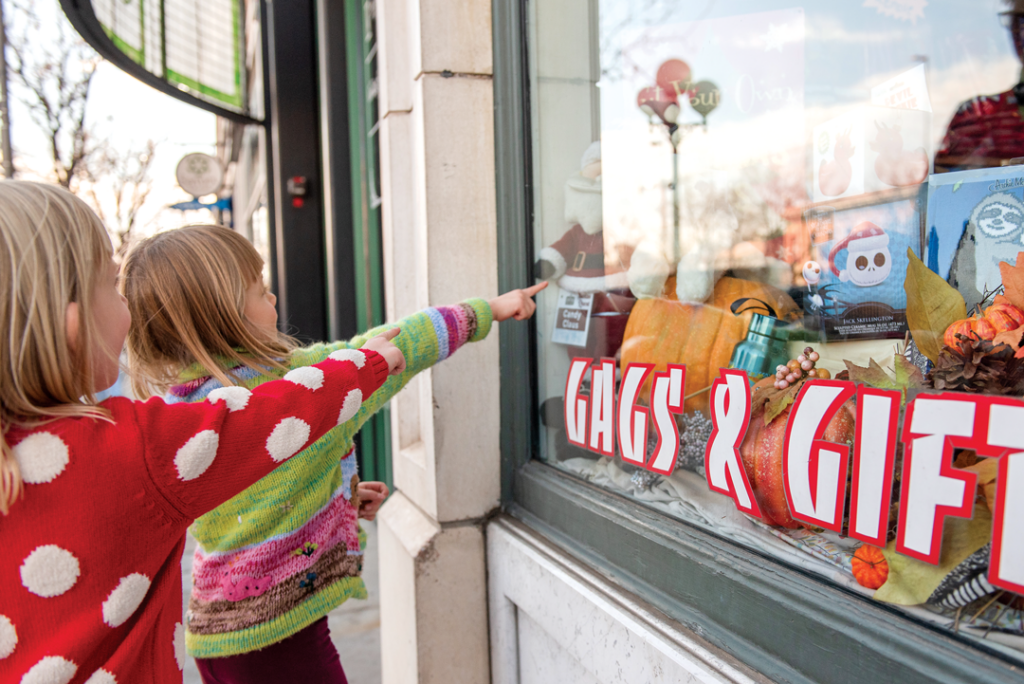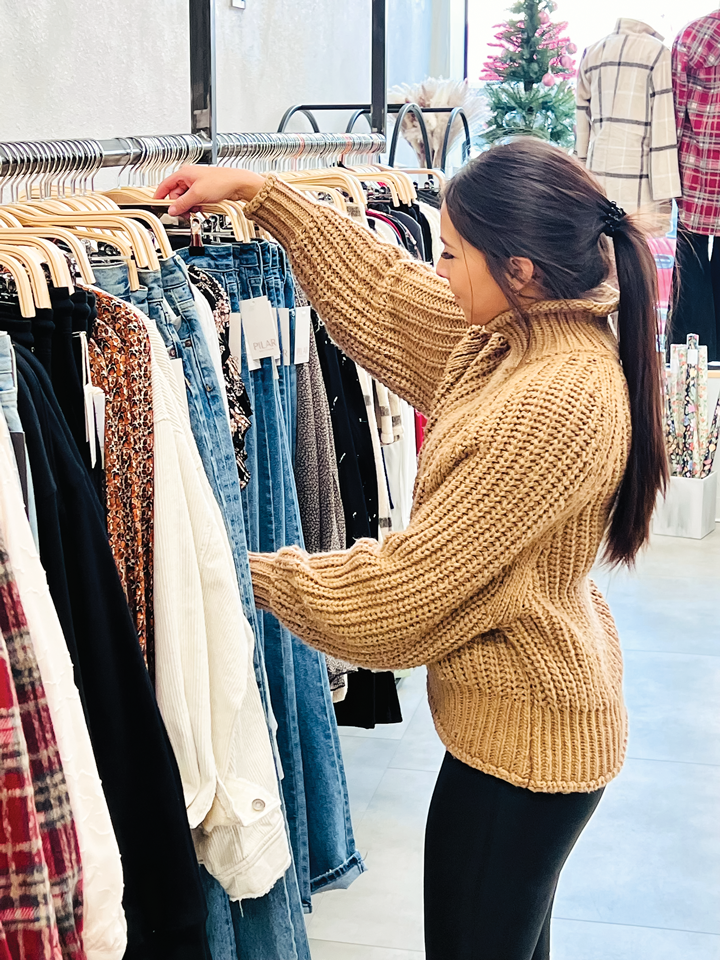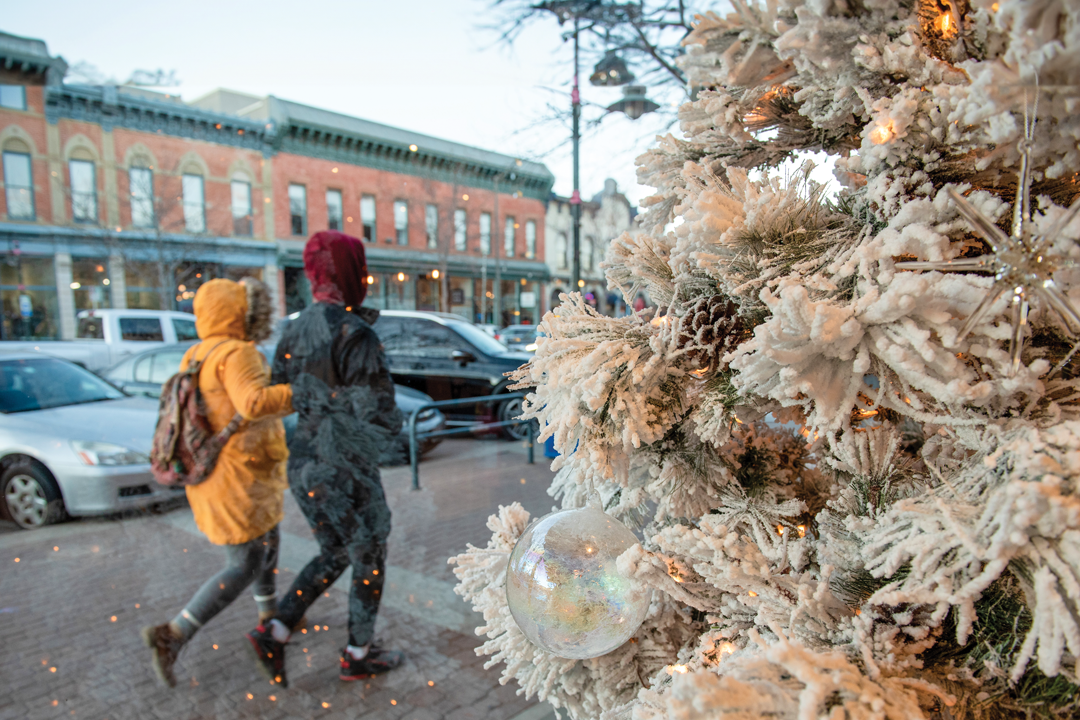Under a canopy of lights, you can browse local shops as holiday music and the scent of spiced apple cider welcome you inside. Or you can just order an item on Amazon and have it delivered.
Local businesses are hoping that shoppers believe in the wonder of the holidays more than the comfort of their couch.
“It’s really a magical experience,” says Hannah Baltz-Smith, business support coordinator at the Fort Collins Downtown Development Authority. “It’s a beautiful backdrop, and I think the one thing we learned from COVID is that we are very social people. People want to go out and make a day out of their shopping experience with others.”
The Fort Collins downtown lights cover 22 blocks and are on from the first Friday in November through Valentine’s Day. Every holiday season, Santa’s workshop and an ice rink with free skating and skate rentals also pop up in Old Town Square.
All of that is done to boost the holiday spirit and keep those holiday dollars at home, Baltz-Smith says.
“People really like to touch and feel the things they are buying,” she says. “And they can take [them] home to wrap to make it more personal.”
Mindy McCloughan, president and CEO of the Loveland Chamber of Commerce, says customers at locally owned businesses get fantastic service to complement that experience. That service includes recommendations for gifts and extensive knowledge about what you are considering buying.
“Unlike big chains, local businesses often hire people with proficient knowledge of the products they are selling or the business they are running,” she says. “Employees take the time to really get to know their customers and work toward cultivating relationships.”

Kids window shopping in Downtown Fort Collins. Photo by Valerie Mosley Photography.
Impact of Local Shopping
The big push for shopping at local businesses, especially during the holidays, is all about keeping money circulating locally, including taxes.
“Local spending is critical to [small business] success as well as the sales tax earned that keeps our community up to date,” says Colleen DePasquale, executive director of the Estes Park Chamber of Commerce.
Tax dollars, of course, are what local cities and counties spend to support everything from parks to police. Kat Hart, program director for the Loveland Business Development Center, says money spent locally circulates seven times through a community.
“When a customer purchases from a local small business, not only does the business owner pay taxes that circulate through the community to support local services and infrastructure, but that business owner is a community member as well,” she says. “They use their earnings to pay for services for themselves and their families, often from other local businesses, along with paying their employees who also utilize local businesses.”
DePasquale says the money from taxes is good for the local economy, but supporting local businesses also increases their visibility and, let’s face it, tourism for the community.
“Estes Park has a strong entrepreneurial spirit and pride in [its] offerings, whether it is food and beverage or retail,” she says. “Most of our businesses are locally owned and operated versus having large corporate backers. Local spending is critical to their success.”
That local support really makes a community, says Baltz-Smith. “It’s kind of a cliché, but businesses really do see that impact,” she says. “And, really, what you are doing is supporting your neighbor.”
Hart agrees: “It’s not just shopping. People who take the time to get out and shop locally make a day of it and go to local restaurants, use local service providers for arts, entertainment and relaxation and often discover new things to love in their community.”

A customer shopping at PILAR Boutique in Downtown Loveland. Photo courtesy of Dixie Daly, Loveland Chamber of Commerce.
Shopping the Sales
Sales events like Black Friday, Cyber Monday and Small Business Saturday have been around for a while now, but business associations tend to see more value in supporting local businesses all year round—and especially during the holidays.
Black Friday falls on the day after Thanksgiving and is so named because that’s the day crazy sales are meant to help businesses finally get in the “black,” or make a profit for the year. Baltz-Smith says many small businesses still rely on holiday sales to get them out of the red, but it isn’t about doing it just one day.
“It’s a year-round effort,” she says. “But most of our businesses are still reliant on money from the holiday season.”
Black Friday sales have a history of driving employees and customers to the point of exhaustion by extending hours and generating frenzies at big box stores. But for small businesses, it’s usually not that way.
“Black Friday can be the best time of the year to get great deals,” says McCloughan. “The downside to it is the crowded stores with long checkout lines. Some people opt out of Black Friday just to avoid the crowds, but some make it an annual tradition and spend all day shopping as a result.”
Cyber Monday is the Monday after Thanksgiving and is marked by an influx of online deals. Local business organizations see that as an opportunity to promote small businesses who built a strong online presence during the pandemic. “We are still trying to figure out the new normal,” Baltz-Smith says.
Small Business Saturday
Small Business Saturday also comes after Thanksgiving. Founded by American Express in 2010, the nationally corporate-sponsored day brings in big sales for small businesses. Last year, Small Business Saturday accounted for 108 million shoppers nationwide spending $12.9 billion on that Saturday alone. Piggybacking on that effort locally helps generate interest in keeping money close to home and doing so all year.
The Loveland Business Development Center does outreach with local businesses by supporting Small Business Saturday. “We provide free marketing packs to our small businesses, and we have already been hosting classes to help business owners position their marketing to attract holiday customers locally and digitally,” says Hart.
Estes Park created its own “Beyond” program to spark interest in supporting local businesses year round from folks visiting the area for events and festivals. Local businesses load sales offers through a QR code on posters and other materials distributed at those events. “We have had a 400-percent increase in offers loaded since we started this program in September 2022,” says DePasquale.
In Greeley, the Downtown Development Authority kicks off its annual holiday celebration on Small Business Saturday with live performances, sweet treats and sales at local businesses. At the end of the day, the DDA continues its tradition of lighting the trees in historic Lincoln Park.
“Rather than [trying] to compete with the big box stores on Black Friday, we invite people to enjoy a more relaxed, slower, more welcoming shopping experience the following day,” says Alison Hamling, director of experience at the Greeley DDA. “It’s a holiday shopping experience that is more about community and less about grabbing the latest sale item.”
_________________________________________________________________
By the Numbers
The impact of buying locally is borne out of research, according to Mindy McCloughan, President and CEO of the Loveland Chamber of Commerce. Here are some stats she shared:
Of every dollar spent at a locally owned business, about 70 cents stays local. Of every dollar spent at a national corporation, less than 40 cents stays local.
Locally owned businesses contribute more to local charities and fundraisers than their national counterparts. Small businesses donate 250 percent more than large businesses to community causes.
Over $9.3 billion would be directly returned to our economy if every U.S. family spent just $10 per month at a local business.
Local business generates 70 percent more local economic activity per square foot than big box retail.







